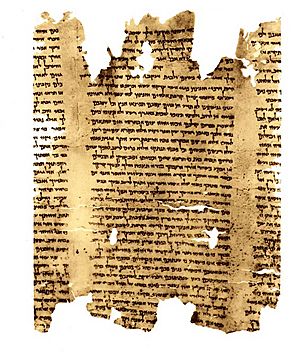Authors of the Bible facts for kids
The Bible is a very old and important collection of writings. It is considered a sacred text by Christians and Jews around the world. It's not just one book, but many different books put together. These books include stories, laws, poems, songs, prophecies, and letters.
Contents
Understanding the Bible
The word "Bible" comes from a Greek word meaning "books." It is divided into two main parts: the Old Testament and the New Testament. The Old Testament shares many texts with the Hebrew Bible, which is sacred to Jewish people. The New Testament focuses on the life of Jesus Christ and the early Christian church.
What Kinds of Books Are in the Bible?
The Bible contains many types of writing.
- History: Stories about ancient times and important people.
- Laws: Rules for how people should live.
- Poetry and Songs: Beautiful verses and hymns, like the Book of Psalms.
- Prophecy: Messages from God, often about the future.
- Letters: Messages written by early Christian leaders to different communities.
Who Wrote the Bible?
For many years, people believed that each book of the Bible was written by the person whose name it carried. For example, it was thought that Moses wrote the first five books of the Old Testament. People also believed that King David wrote all the Psalms and King Solomon wrote the Book of Proverbs.
Different Ideas About Authorship
Today, many scholars and historians have different ideas about who wrote the Bible. They believe that many books were written by different authors over a long period of time. Sometimes, a book might have been started by one person and then added to by others later on.
Why Is Authorship Debated?
There are several reasons why the authorship of some Bible books is discussed:
- Anonymous Writings: Some books do not name their author.
- Writing Styles: The style of writing in some books changes, suggesting different authors.
- Historical Clues: Some parts of books describe events that happened after the supposed author would have lived.
- Shared Names: Sometimes, a famous name was used to give authority to a text, even if that person didn't write every word.
For example, the Pauline epistles are letters traditionally believed to be written by Paul the Apostle. However, some scholars believe that not all of these letters were written by Paul himself. They suggest that some might have been written by his followers after he died, using his name to continue his teachings.
The Role of Scribes and Editors
It's also important to remember that ancient texts were often copied and edited by scribes. These scribes were like skilled copyists. They might have made small changes or added notes over time. This means that the Bible we read today is the result of many people's efforts over thousands of years. It includes the original authors, later writers, and careful scribes who preserved these important texts.
See also
 In Spanish: Autoría de la Biblia para niños
In Spanish: Autoría de la Biblia para niños
 | May Edward Chinn |
 | Rebecca Cole |
 | Alexa Canady |
 | Dorothy Lavinia Brown |


